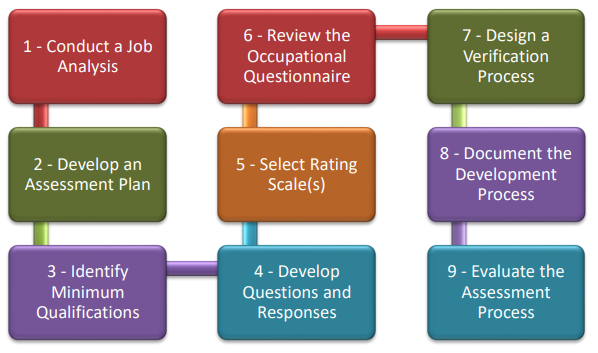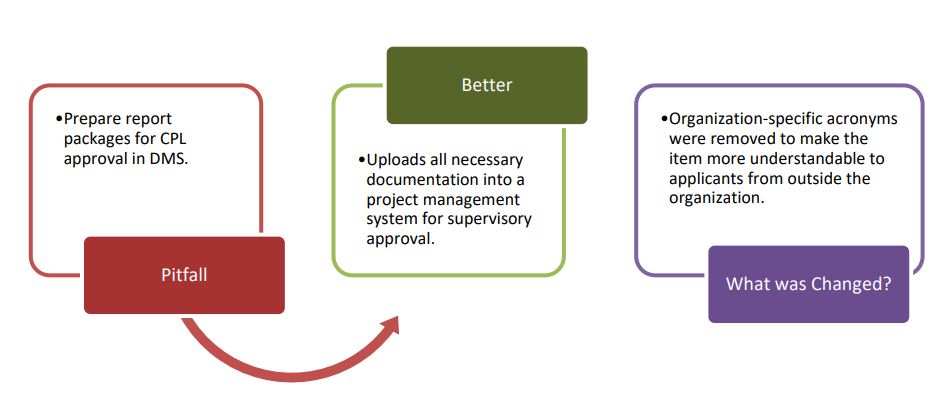

To help agencies get hiring right, the Office of Personnel Management has new guidance for managers to pick candidates based on broader past experiences.
Agency hiring managers should focus more on what job candidates know how to do, not where they learned it.
The Office of Personnel Management is trying to help agencies address the longstanding struggle of hiring the right people to job openings with new guidance released on May 19.
“Skills-based hiring will expand talent pools by making it easier for applicants without a bachelor’s degree to demonstrate their skills and will help remove barriers to employment for historically underrepresented groups,” OPM Director Kiran Ahuja said in a May 19 press release.
To better compete with the private sector for hiring high-quality candidates, agencies should emphasize skills rather than education, OPM wrote in a May 19 memo.
Skills-based hiring values “all relevant skills for the role at hand, whether they are learned in the classroom, on the job or on one’s own,” OPM wrote.
The new OPM guidance comes from a 2020 executive order on modernizing and reforming the assessment and hiring of federal job candidates, which calls on agencies to take a “deeper dive” to address the qualifications of job applicants beyond education, training and experience.
Federal hiring managers can use the guidance to better identify qualifications, develop questionnaires and filter down to the best applicants in the early stages of hiring, OPM said.
Early on in the hiring process, agencies should broaden questions and use clear language to allow for more qualified applicant pools, OPM said. If the questions are too specialized, it can unintentionally remove strong candidates without giving them the opportunity to convey their skills.
By broadening the questions beyond just looking at education, agencies can find the best suited candidates for a position. The early-stage hiring questions should be based on things like job-related work experience, education and training to reach the best candidates, OPM said.
Unclear language in a job announcement, for instance, can create candidate pools unsuited for the opening, but with the guidance, OPM said managers can more easily find skilled candidates the first time around, avoiding the “wasteful” need to re-post positions.
A nine-step process will help agencies determine the minimum requirements for applicants to be accepted into the hiring process and screens out poorly suited candidates, OPM said.

Occupational questionnaires are not meant for every position. They can help fill jobs quickly, but they can also lead to distorted responses, OPM said. For instance, it may not be ideal for entry-level positions.
When developing these questionnaires, there are some pitfalls that agencies should avoid. For example, when developing questions, OPM said it recommends writing succinctly, avoiding government jargon and avoiding asking about overly specialized skills. These adjustments provide room for more candidates to show their skills, especially if they are coming from outside the federal workforce.

Using subject matter experts will also help hiring managers identify strong candidates, OPM said. These experts on the qualifications for particular jobs include first-level supervisors and high-performing incumbents in the same or similar positions.
“SMEs will be most knowledgeable about what is performed in the job and which behaviors make their high-performing employees successful,” OPM wrote in the guidance.
Hiring managers should involve SMEs throughout the entire hiring process, OPM said. That includes, for example, using SMEs to help determine what competencies to measure for in questionnaires, as well as evaluate the effectiveness of the questionnaire for selecting the best candidates.
The guidance also builds on a pilot using a subject-matter expert qualification assessment (SME-QA) in the hiring process.
The SME-QA process, which the U.S. Digital Service developed, helps agencies evaluate candidates for technical positions. In the pilot, agencies bring in SMEs to help hiring managers hire high-quality, fitting applicants.
Competency and skills-based hiring is “a critical best practice for ensuring that teams are appropriately equipped to accomplish the important work at hand,” Mina Hsiang, administrator of the U.S. Digital Service, said in OPM’s press release. “At U.S Digital Service, we have from the beginning used the skill-based hiring approach to identify and hire talent, as it has become the standard approach in the technology sector, based on its ability to hire skilled professionals no matter their formal background.”
The OPM guidance also aligns with the first priority in the President’s Management Agenda, strengthening and empowering the federal workforce, which calls on agencies to attract the right talent for the right roles. The PMA aims to increase hiring managers’ satisfaction with the hiring process.
Additionally, by using a skills-based approach to hiring, Ahuja said she hopes to open doors to more underserved communities. With a reduced focus on college education, for example, agencies can identify more quality candidates who developed the same skills outside of the classroom.
“By drawing from the diversity of this country, agencies can be better equipped to tackle the challenges before us,” Ahuja said.
Joe Paiva, vice president of HireVue and former Chief Information Officer at the International Trade Administration, said in an interview with Federal News Network that when you look at the current federal workforce, it doesn’t necessarily resemble the population it is meant to serve, especially for senior-level positions.
“One of the challenges in government is that we write job descriptions so tightly that unless someone’s an insider, they have no chance of getting the job,” Paiva said. “What ends up happening is you recycle the same people over and over.”
Congress is also pushing for similar candidate assessments: The Chance to Compete Act, which House Committee on Oversight and Reform passed in April, would increase the use of SMEs in the hiring process, as well as remove focus from education when assessing candidates.
Paiva said the details from OPM will help agencies to hire based on competencies, but the new guidance is only the start of reforming the process.
“That’s where it’ll be up to agencies in order for this to really work, in order for us to actually start hiring the best people,” he said.
For further guidance, OPM said agencies can attend upcoming sessions to get more tools and resources for reforming the hiring process.
Copyright © 2025 Federal News Network. All rights reserved. This website is not intended for users located within the European Economic Area.
Drew Friedman is a workforce, pay and benefits reporter for Federal News Network.
Follow @dfriedmanWFED



